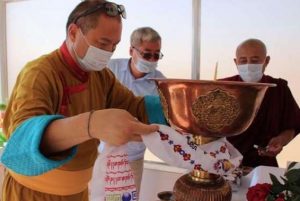Beginning in the academic year 2023–24, the Centre of Buddhist Studies (CBS) at the University of Hong Kong will offer introductory to advanced-level courses in the Buddhist languages of Pali, Sanskrit, and Tibetan for undergraduate and graduate programs. These courses are designed to delve into the world of sacred Buddhist texts and explore the roots of Eastern philosophies, with immersion in the rich tapestry of history.
Each language course will include four levels. Levels I and III will be offered in Semester One, which runs from early September 2023 to late November 2023. In Semester Two, levels II and IV will be offered from mid-January 2024 to end-April 2024. Examinations for the respective courses will be held at the end of each semester. Previously, CBS only offered levels I and II for the language courses. In all courses, students will learn about Indian culture, language, literature, and Buddhist philosophy.
All courses will be taught in person. Anybody who is interested is welcome to enroll, including current students, alumni, and the public. According to the scheduled laid out by CBS, the courses are held every Saturday and Sunday at the HKU campus.
“Studying Buddhist languages can provide numerous benefits, ranging from deepening our understanding of the teachings to opening up academic and professional opportunities,” said CBS director Prof. Georgios T. Halkias. “It allows us to engage with the original texts, rather than relying on translations. This provides a more accurate and nuanced understanding of the teachings.”

According to Prof. Halkias, “Translations can sometimes be limited by the translator’s understanding, cultural biases, or the constraints of the target language. By learning the original languages, we can bypass these limitations and access the teachings in their original form. It can also help us gain a deeper understanding of the cultural context in which the teachings evolved. This, in turn, can enhance our appreciation for the richness and diversity of the Buddhist tradition.”
There are no pre-requirements to enroll in level I. Even the ability to read and write Tibetan and Devanagari, for Tibetan and Sanskrit respectively, is not expected of students. For Levels II, III, and IV, students must have prerequisites, and the course teacher will assess a candidate’s proficiency in the relevant language.
According to the CBS’s email distribution, the set of language courses is a “comprehensive curriculum designed to build proficiency in reading and writing, while exploring the literature, history, and culture of each language.”
“Learning Buddhist languages can help us develop qualities such as patience, persistence, and humility, and facilitate a deeper understanding of key concepts, which can inspire reflection, introspection, and spiritual growth,” said Prof. Halkias. “Last but not least, developing proficiency in Buddhist languages can open up a wide range of academic and professional opportunities. Whether we are interested in pursuing a career in academia, translation, or research, having a strong foundation in Buddhist languages is a valuable asset that can help us connect with scholars and practitioners from around the world, fostering collaboration and the exchange of ideas.”
Interested candidates can check enrolment details here
Enquiries: Tel: (852) 3917 5009; Email: [email protected]
Related news reports from BDG
Dharma Realm Buddhist University Professor Receives Fulbright Award for Research in India
Texas Professor Earns Fulbright Grant to Research Buddhism in Taiwan
Rare Tibetan Buddhist Manuscripts Translated into Hindi Poised for Publication
Harvard Launches Thich Nhat Hanh Center for Mindfulness in Public Health
Buddhist Studies Scholar Jiang Wu Wins Prestigious Guggenheim Fellowship












